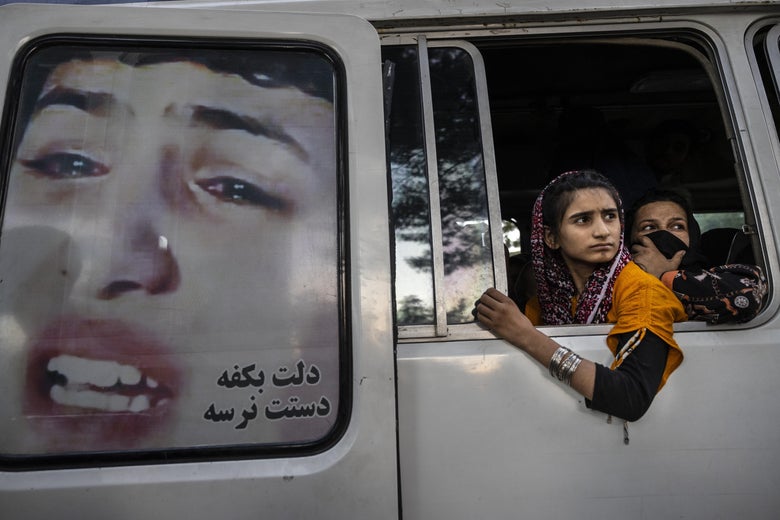BILAL ASKARYAR

In the months before the Taliban took control of Kabul the first time, one phone call signaled the dark times ahead for our family.
It was 1996, and my mother was shouting on the phone as if to make her voice physically carry across the space separating California and Afghanistan.
On the other end was my cousin Fereshta, whose name is the Persian word for angel. Fereshta told my mother how the Taliban were beating women in the streets, how they were hanging people in public, and how she didn’t know what to do next. My mother was visibly shaken. The memory of their voices on the phone has never left me. It’s hard to forget the sound of an angel screaming.
That memory was later replaced by a brighter one. In 2013, I was working in Afghanistan, and on Eid that year, I was able to travel to Mazar-e-Sharif to see Fereshta. I met her and her soft-spoken, intelligent daughter, who was learning to drive and then dreaming of becoming a pilot. The north was safe, and in the family’s little SUV, my cousin’s daughter drove us across the green hills of Mazar that turn red with poppies every spring.
But now, just as with my parents and the generation before them, that sparkling memory of hope, or even just the possibility of hope, is a memory of a place that doesn’t exist anymore. Afghan civil society and we in the diaspora warned this would happen. But for the past decade, it seems the only Afghan the United States wanted to listen to was Dick Cheney’s old pal from the oil industry, Zalmay Khalilzad, who served in four presidential administrations culminating in this year’s last-minute push to reach a withdrawal agreement with the Taliban.
President Joe Biden chose to expedite the withdrawal of U.S. troops during the height of summer fighting season, knowing full well that is when the Taliban are most active. Biden’s sped-up withdrawal also meant Afghans who were worried for their safety and trying to make the best decision for their families couldn’t get passports to leave the country in time. The Ministry of Foreign Affairs was already overwhelmed processing requests, and current U.S. policies require Afghans seeking P1 or P2 refugee status to leave the country first. The searing images at the airport in Kabul, of people so desperate they were literally holding onto planes taking off, are a direct result of Biden’s decisions. Could that C-17 have carried 600 Afghans to safety in a more orderly fashion just a week ago?
This chaos did not unfold, as Biden so nonchalantly said in his address to the nation Monday night, because Afghans “did not want to leave earlier.” It did not unfold, as White House national security adviser Jake Sullivan said, because Afghans did not have “the will” to fight the Taliban.
The White House has clearly revealed its lack of policy on Afghanistan—and its refusal to listen to Afghans.
In his speech on Monday night, Biden repeated the old Orientalist trope about Afghanistan being a “graveyard of empires” and asserted multiple times Afghans wouldn’t fight for their own country. As Afghans, we’re used to our nation being reduced to a cliché by talking heads, but this one was particular painful to hear. Since 2007, over 70,000 Afghans—men and women—who were members of the security forces or the national police sacrificed their lives for the possibility of hope. Many more were killed while just trying to build their own lives.
For the remaining soldiers who were left to guard the fragile state after the U.S. made its intention to leave clear, what did the White House expect them to do? The deck was stacked against them and solidly in the Taliban’s favor. The U.S. had announced the time and date of its retreat, spent the last few years sidelining and delegitimizing the state it was sworn to protect, and negotiated for the release of the Taliban’s leader and hundreds of other prisoners held in Pakistan. Did we expect them to fight against such odds? They have families too.
I don’t know where my cousin Fereshta or her daughter, the erstwhile future pilot, are today. But like every other Afghan I know in the diaspora, I’ve spent the last 48 hours collecting passport information and documents of family members and complete strangers seeking safety. It’s a pattern that’s familiar to us now.
The end of the United States’ fraught, complicated, and dirty involvement in Afghanistan didn’t have to come like this. Biden inherited a war exacerbated by his predecessors, but that didn’t mean he had to follow their disastrous lead. Even at this late stage, it’s possible to mitigate the all but certain humanitarian disaster by enacting a bold plan that grants humanitarian parole to all Afghans in danger—especially the women and girls that the United States spent the last 20 years saying it cared about. The brave Afghans who cannot or will not leave their country also must be supported. The United States must not grant any form of legitimacy for the Taliban, and it must demand that access to education for women and girls be a clear red line for the international community.
Washington hasn’t listened to our voices the last 20 years. This time, it needs to.
No comments:
Post a Comment